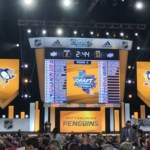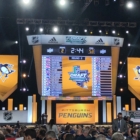By Ryan Porth
Before I begin, here is a list of 11 notable players who have such front-loaded contracts (beginning with the most recent)…
Ilya Kovalchuk, NJ… 17 years, $102 million
First 11 years: $98.5 million ($8.95M average)
Last 6 years: $3.5 million ($583K average)
Overall cap hit: $6 million
Duncan Keith, CHI… 13 years, $72 million
First 8 years: $57.75 million ($7.22M average)
Last 5 years: $14.25 million ($2.85M average)
Overall cap hit: $5.538462 million
Marc Savard, BOS… 7 years, $28.05 million
First 4 years: $25.5 million ($6.38M average)
Last 3 years: $2.55 million ($850K average)
Overall cap hit: $4.007143 million
Roberto Luongo, VAN… 12 years, $64 million
First 8 years: $57 million ($7.13M average)
Last 4 years: $7 million ($1.75M average)
Overall cap hit: $5.333333 million
Chris Pronger, PHI… 7 years, $34.45 million
First 4 years: $29.4 million ($7.35M average)
Last 3 years: $5.05 million ($1.68M average)
Overall cap hit: $4.921429 million
Marian Hossa, CHI… 12 years, $63.3 million
First 8 years: $59.3 million ($7.41M average)
Last 4 years: $4 million ($1M average)
Overall cap hit: $5.275 million
Vincent Lecavalier, TB… 11 years, $85 million
First 8 years: $78.5 million ($9.81M average)
Last 3 years: $6.5 million ($2.17M average)
Overall cap hit: $7.727273 million
Johan Franzen, DET… 11 years, $43.5 million
First 7 years: $36 million ($5.14M average)
Last 4 years: $7.5 million ($1.88M average)
Overall cap hit: $3.954545 million
Henrik Zetterberg, DET… 12 years, $73 million
First 9 years: $67.65 million ($7.52M average)
Last 3 years: $5.35 million ($1.78M average)
Overall cap hit: $6.083333 million
Scott Gomez, MTL (signed w/ NYR)… 7 years, $51.5 million
First 5 years: $44 million ($8.8M average)
Last 2 years: $7.5 million ($3.25M average)
Overall cap hit: $7.357143 million
Daniel Briere, PHI… 8 years, $52 million
First 6 years: $47 million ($7.83M average)
Last 2 years: $5 million ($2.5M average)
Overall cap hit: $6.5 million
Everyone talks about how Detroit GM Ken Holland was the ‘innovator’ of these front-loaded contracts that are now getting dished way too often. While he may have made them more of a regular thing for others around the league, it was the summer of 2007 when the ball really started rolling here.
Buffalo was in a bidding war with the Flyers for the services of Danny Briere. If my memory serves correct, they were both offering similar contracts – cap hit-wise – to the one Briere received ($52 million over 8 years).
But Philadelphia was able to include something in that pact that Buffalo simply could not: (much) more money in the early years of the deal.
Briere made $26 million in the first three years of his contract, a direction that the ‘small-market’ Sabres couldn’t go in. That’s when the NHL lost its competitive balance within the salary cap (to use Dirk Hoag’s term from On The Forecheck).
Tampa Bay is the only ‘small-market’ team to use this front-loaded option, and that was to lock up Captain Vincent Lecavalier on an 11-year deal (as seen above).
Ilya Kovalchuk’s deal with the Devils – reportedly $102 million over 17 years – makes this even more of a mockery. For the next 11 years, Kovalchuk will make more than every other NHLer not named Alex Ovechkin. For the last six years, you ask? That’s Wade Belak money, and Kovy may not even be playing when those years roll around.
We can debate it all day whether he deserves that kind of coin… but the fact that Devils GM Lou Lamoriello signed Kovalchuk, 27, at a much-reduced cap hit until he’s 44 shows that too many general managers are taking advantage of this loophole.
I know Dirk mentioned the ‘competitive balance’ in the piece I linked to, but it can’t be reiterated enough: these contracts need to be removed from the NHL when the next CBA is negotiated.
When the league implemented the salary cap after the lockout, it was supposed to give all 30 teams a realistic shot at free agents. Just look at some of the moves that transpired in 2005; then-stars Paul Kariya and Adam Foote found new homes in Nashville and Columbus, respectively, while future Hall of Fame blueliner Scott Niedermayer jetted for Anaheim.
Now you have the stars signing in the big markets where they can offer more money – especially in the initial years.
(Another part of this equation is the steady climb of the salary cap ceiling, which has enabled the teams that spend to that ceiling to reel in the bigger free agents, while the smaller-market teams have to stay near the floor.)
Whether it’s Holland or any other general manager handing out these contracts that circumvent the cap, this is something that must be taken out of the NHL. I don’t really mind the deals that go over ten years; that’s the team’s decision to keep a player that long. But when you make these contracts go over a decade long just to work around the cap is borderline absurd. I mean, just look at the layout of Kovalchuk’s contract. Ridiculous.
** Ryan is a diehard hockey fan that would prefer to watch a Leafs-Islanders regular season replay over any NBA game! He’s been the editor in chief of RLD Hockey since it started in 2008, and also contributes to Inside Hockey. You can follow him on Twitter here.








Nice to see I have company in this arena…woooooo
I agree !!
This is the ABJECT STUPIDITY you get when arguing with the 1 of the 14 Debbies Fans
How did he not play by the rules? He did what every other team is doing…frontloading a long term contract to lessen the cap hit.
EVERY TEAM is Doing it ????
I just can’t believe they ever thought it would get approved. Sure, other teams have tried somewhat similar deals but none of them runs through age 44. I’m not a fan of these contracts to begin with but this one was just crazy.
I hate hearing people talk about a double standard in comparison to some of the other front loaded deals. It’s one thing to take a 35 year old player in good shape and sign them to a 6 or 7 year deal because you can reasonably project their longevity and productivity based on their career thus far. Taking a 27 year old (no matter what kind of shape they’re in or how productive they’ve been) and trying to project that out over 17 years and say that you legitimitely believe they will still be playing at 44 is absurd. If teams want to put themselves at risk by signing dumb deals then fine, let them. But what the NHL really needs to do is take away the easy outs.
Rather than say no front loaded deals allowed, maybe just make any contract over 7-10 years long has to go by the “over 35” rules so it will count against the cap even if they retire. Or maybe any contract that ends when the player is over 38-40 must play by those rules regardless of length. If the player doesn’t play out his contract then the team should be left paying for him to sit at home or be forced to buy out the contract at a cost relative to the cap hit rather than the money owed.
Obviously someone in NHL management tried to protect against this somewhat by having limits on how much a salary can increase or decrease over the course of a contract but the percentages are just not tight enough to handle a contract that goes this long. I think there might be a place in the NHL for somewhat front loaded contracts but none of this crap where it’s millions up front and league min for 5 years at the end.